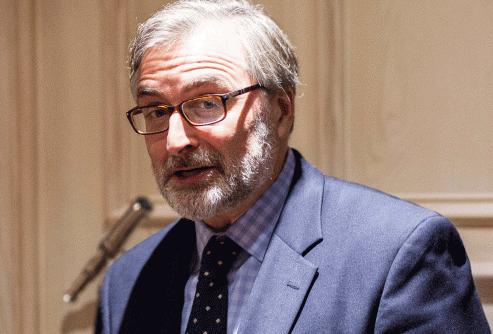
1 minute read
Faculty of Science and EngineerIng
Faculty HigHligHts Faculty oF arts, celtic studies and PHilosoPHy
metaphysics of the ‘between’ to the ream of aesthetics. Dr Amos Edelheit was responsible for a critical edition, with English translation, commentary, and introduction, of Giovanni Caroli’s (1428–1503) Book of My Days in Lucca (Liber dierum lucensium). Writing at a time of crisis and transition, Caroli reflects on the reform of the Dominican order, combining in his work elements of scholastic and humanistic learning.
Among article-length publications, it is worth highlighting Professor Rosemann’s long entry on the twelfth-century theologian Peter Lombard for the Dictionnaire d’histoire et de géographie ecclésiastiques; the piece was written as an account of the current state of knowledge on this important figure. Professor Michael Dunne, continuing his research on the Irish philosophical heritage—particularly in the medieval period—published 'Aristotle's Natural Philosophy in the Writings of Peter of Ireland'. Dr Susan Gottlöber contributed two chapters, on Edith Stein and Simone Weil, to a critically-acclaimed German handbook on the philosophy of religion, Religionsphilosophie und Religionskritik. Ein Handbuch. Dr Mette Lebech authored ‘A Steinian discussion of Joseph Ratzinger's reflections on the problems faced by Europe today’ for a topical volume devoted to Europe and Its Identity in the thought of Edith Stein.
Professor Philipp W. Rosemann
In 2018, the staff of the Philosophy Department were once again active in contributing to major international conferences. Professor Rosemann delivered the keynote address at the Boston Colloquy in Historical Theology, offering a brief account of his new book, Charred Root of Meaning.
Dr Amos Edelheit appeared at no fewer than four conferences:
1. Lecture at the international conference on La filosofia di Giovanni
Pico. Tra fonti e fortuna. Nuove perspettive storiografiche, held at the Istituto Nazionale di Studi sul Rinascimento, Palazzo Strozzi,
Florence. Title: ‘Pico and the Scholastics: Formation, Traces,
Reception’. 2. Lecture at the Sixty-Fourth Annual Meeting of the Renaissance
Society of America, New Orleans. Title: ‘Pico and the “Parisian
Style”: Paris in the 1480s’.
3. Lecture at the International Symposium on Plato, his Dialogues and Legacy, held at Bar Ilan University (Israel). Title: ‘The Case of
Plato’s Charmides in the Fifteenth Century: Ficino, Poliziano, and a Lesson from Bruni. Preliminary Notes’.
4. Lecture at the departmental seminar of the Department of
Classics, Tel-Aviv University. Title: ‘Classical Scholarship and
Philosophy in the Italian Renaissance’.
Dr Edelheit’s new book, mentioned above, was launched at Santa Maria Novella, Florence, by Professor Franco Bacchelli, Professor Marco Forlivesi, and Father Luciano Cinelli O.P.
Dr Susan Gottlöber delivered lectures at three conferences, both in Ireland and abroad:
1. Lecture at the conference ‘Aliter infinitum—anderswie unendlich’ at the University of Erfurt (Germany). Title: 'Nikolaus von Kues als Gegenstand verfolgter jüdischer Forschung bei
Martin Buber'.
2. Lecture at the conference of the North American Society of Early Phenomenology on ‘Time, Memory, and Eternity’ (Pittsburgh). Title: ‘Time, Aging, and Death in the Thought of Max Scheler'.
3. Invited Speaker at the Annual Conference of the Irish
Philosophical Society at UCD. Title: 'Toleration and Hospitality'.
Dr Mette Lebech, too, contributed to several academic gatherings, including a workshop she herself organized:
1. Lecture at the Research Seminar on Phenomenological
Metaphysics, University of Würzburg. Title: ‘Sinn des Seins. Die
Metaphysik Edith Steins‘.
2. Contribution to a Panel Discussion on the Eighth Amendment,
DCU Philosophical Club, DCU. Title: ‘Human Dignity’.
3. Organization of a two-day research seminar at Maynooth
University on Stein’s The Structure of the Human Person. Lecture:
‘The Problem of the Origin of the Species—Species, Genus,
Individual’.
Finally, Dr Cyril McDonnell travelled to Bucharest, where he was invited to present a paper at the International Conference ‘Brentano—Comte—Mill. The Idea of Philosophy and Psychology as Science’, organized by the University of Bucharest. Dr McDonnell spoke on ‘Scientific and Unscientific Methods in Empirical Psychology: Brentano’s Dispute and Critique of Comte, Mill, and Maudsley’s Accounts of Inner Perception’.
In sum, the Maynooth University Department of Philosophy has a remarkable presence in the international research community.
dePartment of bIology
PublIcatIons hIghlIghts
Research groups in the Department of Biology have published a total of 79 publications in the year, 55 of which were in peer-reviewed journals (research articles and reviews). Most of these publications were in peer-reviewed journals that are very well considered and respected in their fields of research (impact factors between 3 and 10; e.g. Infection and Immunity; Journal of Immunology; New Phytologist; Genome Biology and Evolution; Scientific Reports), with at least 3 publications in high-impact factor (>10) journals (Nature Communications; Nature Immunology; Nucleic Acids Research).
fundIng hIghlIghts
Dr Eoin McNamee
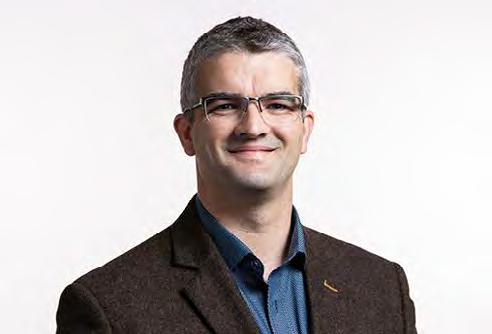
> Dr Eoin McNamee; SFI Future Research Leaders Award; MicroRNA Control of Mucosal Inflammation; €1,207,251.
> Dr Joanne Masterson: SFI Future Research Leaders Award;
Transcriptional Mechanisms Controlling Epithelial Cell Fate
Determination during Allergic Esophageal Inflammation in
Eosinophilic Esophagitis; €1,572,600.
> Dr Andrew Hogan; National Children’s Research Centre Crumlin;
Childhood Obesity and Vaccine Responses; €234,459.
> Dr Mark Robinson; Health Research Board; The liver neighbourhood watch: regulatory tissue-resident natural killer (NK) cells protect against liver decompensation in patients with chronic liver disease; €475,969. > 4 postgraduate scholarships:2 Irish Research Council, 1 Walsh fellowship, 1 Environmental Protection Agency (the last of these co-financed by The Kathleen Lonsdale Institute for Human
Health Research).
PrIzes
> Dr Karen English was awarded the IRC Early Career Researcher of the year award in December 2018. > Professor Paul Moynagh was elected to the Royal Irish Academy.
summary of external engaged research
Several researchers have been involved in consultancy projects including public institutions and companies such as Teagasc (R. Owens) and an SME biotech in California (J. Masterson).
In addition, contributions towards public policy include activities by Dr Fiona Walsh in relation to antimicrobial resistance (EPA and the European Centre for Disease Control DG-Sante). The Department also contributes to international organizations. For example, Dr Fiona Walsh contributes to the Expert committee on AMR in Food, crops and the environment, Food and Agriculture Organization (FAO) of the United Nations.
Members of the Biology Department engage in a large number of collaborations both nationally (e.g. with TCD and UCD) and internationally (e.g. other universities in Europe (Imperial College London, University of Natural Resources and Life Sciences in Austria, INRA in France, Leibniz Institute in Germany) or with institutions in the U.S. (e.g. Denver & Children’s Hospital Colorado) and in Canada (McMaster University in Hamilton, Canada) as well as collaborative projects with industry (Nektr Technologies (J. Carolan), Clarins (K. Kavanagh), and Alltech (F. Walsh). The dynamic network established by members of the Biology Department is also visible in the authorships of many of the articles published in 2018.
contrIbutIons towards PublIc PolIcy
The EU performed an audit of the activities of the Irish government bodies in relation to antimicrobial resistance. F. Walsh was invited by the EPA to present her research findings and discuss these with the European Centre for Disease Control DG-Sante.
F. Walsh is also a member of the Expert committee on AMR in Food, crops and the environment, Food and Agriculture Organization (FAO) of the United Nations. The report of the meeting held on the role of crops, biocides and the environment in food borne AMR was published this year (Expert committee member on AMR in Food, crops and the environment, Food and Agriculture Organization (FAO) of the United Nations).
dePartment of chemIstry
2018-2019 was another strong year for the Chemistry Department in terms of research. 30 research articles (recorded in Scopus) were published by 12.5 FTE academic staff in 2018, with an average of 2.4 papers per academic. In 2018, 20% of Chemistry Department research articles are in the 10% most cited worldwide, with 37% of articles in the top 10% of journals. The department continues to have a strong international profile, with 51.2% of articles (20162018) published with international co-authors. 7% of publications include an industry co-author.
The department continues to be highly interdisciplinary, with only 37% of research articles in chemistry -specific journals with significant contributions to journals at the interface of Physics, Chemical Engineering, Material Science and Biochemistry making up an additional 39% of publication activity.
Several recent publications have been highlighted as “Most Cited” for the Department (source: SciVal in 2018) and include:
1. The physics of protein self-assembly. McManus, J.J.,
Charbonneau, P., Zaccarelli, E., Asherie, N. (2016) Current Opinion in Colloid and Interface Science, 22, pp. 73-79. (63 citations).
2. Creatinine and urea biosensors based on a novel ammonium ionselective copper-polyaniline nano-composite. Zhybak, M., Beni,
V., Vagin, M.Y., Dempsey, E., Turner A. P. F., Korpan, Y. (2016)
Biosensors and Bioelectronics, 77, pp. 505-511 (42 citations).
3. Macrocyclic squaramides: Anion receptors with high sulfate binding affinity and selectivity in aqueous media. Qin, L., Hartley,
A., Turner, P., Elmes, R. B. P., Jolliffe, K. A. (2016) Chemical
Science, 7 (7), pp. 4563-4572. (38 citations).
4. Bioreductive fluorescent imaging agents: Applications to tumour hypoxia. Elmes, R.B.P. (2016) Chemical Communications, 52 (58), pp. 8935-8956. (36 citations).
5. Coordinated Acetylcholine Release in Prefrontal Cortex and
Hippocampus Is Associated with Arousal and Reward on Distinct
Timescales. Teles-Grilo Ruivo, L.M., Baker, K.L., Conway, M.W.,
Kinsley, P. J., Gilmour G., Phillips K. G., Isaac J. T. R., Lowry, J. P.,
Mellor, J. R. (2017) Cell Reports, 18 (4), pp. 905-917. (25 citations).
In July 2019, Dr Jennifer McManus published an Edited Volume of Methods in Molecular Biology series, published by Springer on the topic of Protein Self-Assembly, with chapters contributed by researchers in Ireland, the UK, US and Italy.
Methods in Molecular Biology
A number of prestigious research grants were awarded in 2018/2019, including an Irish Research Council postdoctoral award to Lokesh Kumawat working with Dr Robert Elmes and an IRC Ulysses grant to Dr John Stephens to work with collaborators in France. Ongoing grants include an SFI PI award to Professor John Lowry and a US National Institutes of Health grant to Professor Lowry in collaboration with Professor Colm Cunningham at TCD.
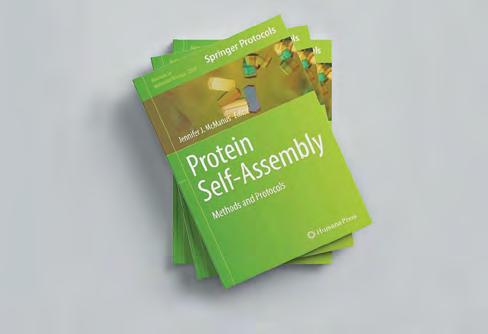
A number of engaged research projects started/continued in 2018/2019, including an Innovation Partnership between Dr John Stephens and Dairygold (in collaboration with Dr Andrew Hogan, Department of Biology), a collaboration with Medimmune (Astra Zeneca) UK with Dr Jennifer McManus as part of the MU co-fund programme. In addition, a research contract was fully funded by the Stevanato Group (Italy) working with Jennifer McManus, which has recently resulted in an IP assignment.
In addition, Aoife Harbison, as postgraduate student working with Dr Elisa Fadda received funds from the Royal Society of Chemistry to spend time as a visiting researcher in Canada.
Researchers from the department delivered a number of important talks and seminars in 2018/2019 including:
> Dr Diego Montagner who was an invited speaker at the ASBIC (Asian Biological Inorganic Chemistry Conference) in December 2018, delivered Invited Seminars at the Technological University of Dortmund, Germany in March 2019 and at the “Centro Atomico de Bariloche” in Argentina in July 2019.
> Dr Eithne Dempsey was a Plenary Speaker at the MADICA 2018 meeting in Tunisia in November 2018.
> Dr Jennifer McManus delivered invited seminars at the Cavendish
Laboratory in Cambridge University in November 2018 and at the
Department of Chemical Engineering at the University of Delaware in April 2019. In addition Dr McManus was a Keynote speaker at the Biopharmchem/Pharmachem Skillnet Research Showcase in
Dublin in April 2019.
engaged research
> Consultancy reports
- Dr Jennifer McManus produced two consultancy/technical reports for the Stevanto Group as part of a wholly funded research project.
> Enterprise partnerships
- Dr John Stephens was funded by Enterprise Ireland for a
Commercial Case Feasibility Grant for a “Food additive database”. - Dr John Stephens has an Enterprise Ireland Innovation partnership with Dairygold on “Novel approach to the development of food products for pre-diabetics and those with impaired glucose tolerance (IGT)”. - Dr Jennifer McManus has a co-funded project with Medimmune (Astra Zeneca) UK on “The biophysics of peptide and protein assembly”.
- Dr Jennifer McManus had a fully industry funded grant from the
Stevanato Group about “Proteins on Surfaces” which resulted in 2 consultancy/technical reports and an IP assignment”.
The chemistry department is now providing several analytical services to industry and academic users. Technical staff member Barbara Woods has established a Whiskey Analysis service and had performed analysis for several distilleries in Ireland. Walter Walsh is providing microanalysis services for TCD chemistry and UCD chemistry. All services are providing income that can be used to support instrumentation maintenance.
In summary, the department continues to deliver high quality research, published in highly respected journals, cited at a level consistent with (or above) international norms in the field and with a high proportion of our articles co-authored with international research groups. An increasing number of engaged research projects are being established, either wholly industry funded or co-funded by MU/Enterprise Ireland/IRC. In 2019, two researchers in the department became funded investigators in SSPC, the SFI centre for pharmaceuticals research (Dr Robert Elmes and Dr Jennifer McManus). Two PhD studentships will initially be funded as platform projects within the centre, with potential for significant additional funding through industry partnership and/or SFI Spoke projects and this represents an important development for the Department. The researchers that have been trained in the department continue to excel after graduation with many taking up senior researcher positions in industry and many pursing postdoctoral research at prestigious institutions (Yale, Caltech, Helmholtz Institute), which is a significant indicator of the quality of research performed in the department.
dePartment of comPuter scIence
The Department of Computer Science comprises 23.5 staff and recent growth saw 9 new PhD students begin their studies in 18/19 and 3 PhDs graduated. The department offer a wide range of postgraduate courses in computer science, software engineering, multimedia and mobile systems. Research expertise in the department is diverse spanning areas such as machine vision, cognitive modelling, programming, geospatial data analysis, computational information theory, music technology, formal methods for software engineering, and information retrieval.
Stephen Brown’s PhD student, Joe Finnegan, funded by the SFI Research Centre for Future Networks and Communications (CONNECT) at Maynooth University, is undertaking a collaborative internship at the Universitat Oberta de Catalunya (UOC) in Barcelona for 3 months in early 2020. He will be working in the Wireless Networks Research Group (WINE) which is part of the Internet Interdisciplinary Institute (IN3) at the university. He will be closely working with members of the team there on research related to his PhD - looking at performance enhancements to wireless networking protocols. We expect that this visit will also lead to further collaboration activities with the group.
Joe Timoney & Tom Lysaght in the Music Technology Research Group had a number of activities this year. They will have 2 new PhD students in the Music Tech. field joining in the following academic year, one funded under Women in Stem and another has a HUME scholarship. Both students will be working in the area of IoT. Additionally, the group are working with two Digital Humanities PhD students in the fields of internet archiving and computational literary theory. The group had two visiting professors from Brazil that were funded under the Erasmus Mundus scholars program in DEPEND, Leandro Costalonga and Ricardo Ckestr. Dr Costalonga gave a number of talks on HCI for Music Technology and Dr Ckestr gave a number of talks on Stocastic Automata Networks in Distributed Programming. There were a number of conference presentations during the year including the Digital Libraries for Musicology (DLfM) 2018 held in Paris. Additionally, Joe Timoney became the Vice Chair of the newly inaugurated Irish section of the Audio Engineering Society. They organised a meeting and talk held at MU on May 14th 2018. The group was also a part of a COST Action application ‘Digital Cultures in Europe through Web Archives’ – DIGICULTES.
Dr Tim McCarthy was awarded a grant of €2.5M in collaboration with industry for the U-FLYTE Drone innovation platform. Tim McCarthy represented the Department at the Maynooth University and Intel Ireland signing of a Memorandum of Understanding to create a strategic research and innovation partnership. Other research awards for Tim McCarthy include;
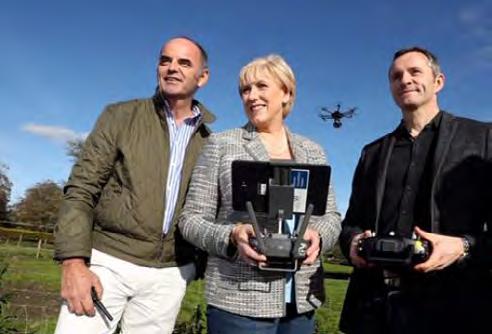
> Co-PI on a 4-year (€380k) H2020 Earth Observation Climate
Change project (MACOBioS).
> Co-PI on EPA project SoMoSAT (€325k) Earth Observation Land
Cover Mapping with Rowan Fealy (Geography/ICARUS).
> PI of Copernicus Academy/Relay coordination funded activities (€170k) here at Maynooth.
Dr Tim McCarthy, Maynooth University with Minister for Business, Enterprise and Innovation, Heather Humphreys T.D, and Dr Ciarán Seoighe SFI Deputy Director General.
Dr McCarthy is collaborating with Dr John McDonald and together with partners drawn from NUI Galway, UCC and IOT Tralee as well as Industry, he led the successful bid for (€1.1m) SFI Research Infrastructure National Autonomous Technologies Data Platform (NATDaP) project, with €514k assigned to McCarthy/McDonald’s team at MU.
Dr McCarthy and Dr McDonald are also collaborating in the SFI Irish Software Research Centre LERO’s Blended Autonomous Vehicles (BAV) initiative (launched successfully in Oct 2019). McCarthy/ McDonald have two projects planned, with the first project, HD Maps (€165k), in partnership with PMS underway.
Dr McCarthy was invited Keynote at 3 X drone Conferences (Dublin, London and Amsterdam), contributed to the Government’s National Space Strategy 2019 – 2025, panel research member for drafting guidelines; Testing of Autonomous Vehicles in Ireland, participated in 10 X Radio, Newspaper, & Online outreach items in 2019. He continues to represent Ireland at European Commission’s Copernicus (Earth Observation) Committee in Brussels on a monthly basis.
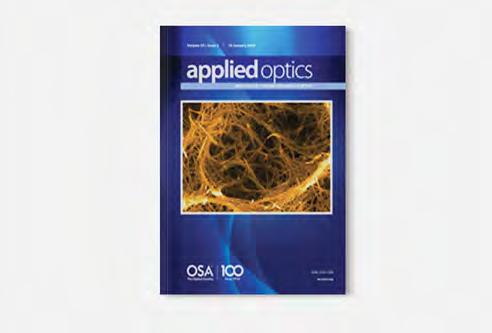
Dr John McDonald’s research group was awarded a grant of €226K to fund a 4-year collaboration with Valeo, a world-leading global automotive supplier. The project is funded through Dr McDonald’s participation in the Lero Irish Software Research Centre and will support two PhD students in the development of techniques for long-term autonomy for self-driving vehicles.
Other achievements and engagements of note during this period include:
> Dr McDonald became an Associate Editor of IEEE Robotics and Automation Letters. He took up the role of Student co-Chair for the European Signal Processing Conference (EUSIPCO) 2021.
> Dr McDonald’s PhD Student, Louis Gallagher won the Best Oral
Paper Award at the Irish Machine Vision and Image Processing
Conference (IMVIP) 2018.
This year saw a significant enhancement in the robotics infrastructure in the department with the delivery of a Rethink Sawyer Collaborative Robot and a PAL Tiago Mobile Manipulator Robot, both providing state-of-the-art research platforms for robotics research. Both of these platforms have been funded under an award of ~€177K to Dr McDonald and Dr Rudi Villing (EEng) through the SFI Infrastructure Programme.
Peter Mooney had a number of publications, public presentations, external engagements and hosted conferences. Since July 2019 he is an Editor of Transactions in GIS with responsibility for editorial duties in Europe, Africa and Middle East, reviewer for the EU COST Association Brussels and Deutsche Forschungsgemeinschaft (DFG, German Research Foundation) (2019). He gave an invited seminar lecture “What are the problems in Crowdsourced Geographic Information?” at The Bartlett Centre for Advanced Spatial Analysis (CASA), University College London, March 6th 2019. Also in June 2019 he was a lecturer and trainer in Citizen Science Training School on the topic of Quality Control of OpenStreetMap. This was held in Coimbra, Portugal, June 2019.
He organised a number of workshops and conferences being:
> Co-Organiser of GeoCultGIS 2019, Geographical and Cultural
Aspects of Geo-information: Issues and Solutions Workshop at
AGILE 2019 and
> Co-Chair and Organiser with his colleague Dr Liadh Kelly of the 1st National Workshop on Smart Farming and Data Analytics in
Ireland (SFDAI) 2019 in Maynooth University, June 12th 2019.
> Chair and Organiser for OSGeoIE 2019, 3rd Irish OSGeo
Symposium, Cork City, May 2019.
> Lastly he has been involved in a number of publicity engagements: - National Rural Network for Ireland (NRN) How do we Transition to Smart Farming in Ireland? April 2019. - Is smart farming a sign of things to come for Irish farmers? RTÉ
Brainstorm Voxpop Video. - RTÉ Brainstorm Podcast: The future of farming in Ireland (with studio interview), July 2019.
Thomas Naughton's group's 2018 journal article was awarded the "Editor's pick" by the journal Applied Optics (publisher OSA - The Optical Society)
Thomas Naughton's group's 2018 journal article "Spacevariant video compression and processing in digital holographic microscopy sensor networks with application to potable water monitoring" (DOI: 10.1364/AO.57.00E190) was awarded the "Editor's pick" by the journal Applied Optics (publisher OSA - The Optical Society) on 1st August 2018. According to the journal, this serves to highlight articles with excellent scientific quality which are representative of the work taking place in a specific field.
Thomas Naughton, John McDonald, and postgrads Tomi Pitkäaho and Taina Lehtimäki participated in an international image analysis competition called the "HER2 Scoring Contest". In this international competition (warwick.ac.uk/fac/sci/dcs/research/ tia/her2contest), the team's deep learning algorithms were up against those from such prestigious institutions as University of Oxford, Carnegie Mellon University, and IIT Guwahati. The results are publicly available at: (warwick.ac.uk/fac/sci/dcs/research/ tia/her2contest/outcome). Our three submitted algorithms were ranked 2, 3 and 4 in the points leaderboard. The results were published in the journal Histopathology in 2018.
Professor Barak Pearlmuter had a number of engagements as an invited speaker. These included:
> Keynote Speaker, Irish Conference on AI and Cognitive Science (AICS), 2019.
> Invited speaker, Languages for Inference (LAFI 2019) Workshop,
Lisbon, 2019.
> Invited speaker, Mathematical Foundations of Program
Semantics(MFPS), Halifax, 2018.
> Invited seminar speaker, Vector Institute, University Toronto, 2018.
> Invited seminar speaker, Microsoft Research, Seattle, 2018.
Professor Damien Woods, Hamilton Institute, Maynooth University
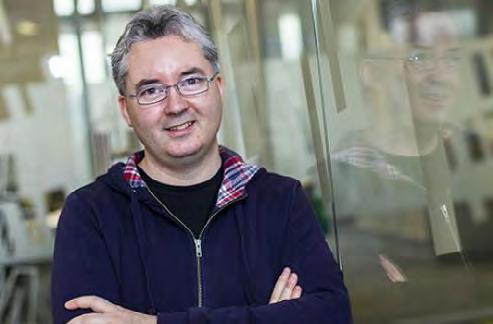
Professor Damien Woods had a prestigious publication in Nature in March 2019:
Damien Woods*, David Doty*, Cameron Myhrvold, Joy Hui, Felix Zhou, Peng Yin, Erik Winfree. Diverse and robust molecular algorithms using reprogrammable DNA self-assembly. Nature 567:366-372. 2019. He was awarded two grants (~4M euro):
> ERC award Active DNA: Computationally Active DNA Nanostructures commenced 1 Nov 2018. €3,297,581.
> SFI ERC support award commenced 1 Nov 2018. €656,500.
Also, Professor Matthew Patitz from the University of Arkansas visited the group for a 6-month sabbatical (Aug-Dec 2019).
Dr Hao Wu had a number of conference committee responsibilities:
> Program Committee: Formal Methods for Autonomous
Systems 2019 (FMAS) under Formal Methods (FM) Symposium
Conference.
> Program Committee/Organiser: Object Constraint Language
Workshop (OCL) 2019 under ACM Model Driven Engineering
Languages and Systems (MODELS).
> Program Committee: Model-Driven Engineering and Software
Development (MODELSWARD) 2019 Conference.
> He also became involved in a new collaboration with Professor Markus Helfort of IVI on smart city architectures and verification.
engaged research
The most active departmental member for this type of work is Dr Tim McCarthy. He is based in the National Centre for Geocomputation (NCG).The Music Technology Research Group was involved in an innovation voucher for Key Genomics LTD.
The Programming, Algorithms and Computational Thinking (PACT) group in the Department (Aidan Mooney, Rosemary Monahan, Thomas Naughton, Kevin Casey, Taina Lehtimäki, Joseph Duffin, Liadh Kelly) are working on externally engaged research to support primary and secondary teachers to introduce computational thinking into (and enhance STEM generally) in their classrooms. Research is conducted into the open problem of how best to teach computer science at primary level. This €370k -budget project (InSPECT) is partially funded through the Science Foundation Ireland Discover Programme with a €273k grant.
Thomas Naughton's group's multi-year research project on "Threedimensional microbiological imaging, automated analysis, and display using digital holography" runs until 2020 and has received a contribution from Science Foundation Ireland of €500k.
dePartment of electronIc engIneerIng
The Department of Electronic Engineering comprised ten academic staff in 2018/19. Members published 28 journal papers, and a further 26 peer reviewed conference papers.
John Halligan TD, Minister of State for Training, Skills, Innovation, Research and Development; Professor Ronan Farrell, Director of RadioSpace; Professor Philip Nolan, President of Maynooth University and Ciarán Seoighe, Deputy Director General, SFI
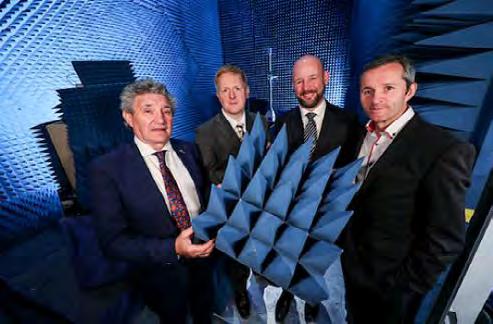
In 2019 the Department opened ‘RadioSpace’ Ireland’s national 5G communications test centre, a €1.5 million facility with investment of €638,000 from Science Foundation Ireland. This reflects Professor Ronan Farrell’s strong involvement with CONNECT, SFI’s Research Centre for Future Networks and Communications. A first of it's kind in Europe the facility consists of a specially constructed anechoic chamber with advanced test equipment for interference-free testing. The centre is open to large industry, SMEs and academic institutions internationally.
The department was successful in securing a prestigious Marie Sklodowska-Curie individual Fellowship for Dr Bingyong Guo who will carry out research under the mentorship of Professor John Ringwood in control parametric resonance of wave energy conversion systems. Professor Ringwood was also awarded the 2019 Maynooth University PhD Supervisory Award, which reflects contributions to supervisory excellence across the University.
Robotics infrastructure in the University was significantly strengthened by an award of €177K to Dr Rudi Villing and Dr John McDonald (Computer Science) through the SFI Infrastructure Programme.
Seven grants, totaling €461,696, were awarded to four investigators. Three academic staff are also currently involved in two SFI national centres both of which were renewed for a second cycle. Professor John Ringwood is a PI in MARei, the SFI centre for ocean and renewable energy, and Professor Ronan Farrell is a PI and Dr John Dooley is a funded investigator in CONNECT, the SFI telecommunications research centre.
In academic year 2018/19, there was a strong pipeline of research student graduations, with 4 PhD students graduating.
dePartment of exPerImental PhysIcs
terahertz sPace oPtIcs (PIs: Professor J.a. murPhy, dr c. o’sullIVan, dr n. traPPe, dr m. gradzIel) euroPean sPace agency research
2019 saw the close of a three-year European Space Agency (ESA) research contract entitled “Next Generation Sub-Millimetre Wave Focal Plane Array Coupling Concepts” (PI Dr N. Trappe). This Technical Research Contract was a large European collaboration that included groups from Cardiff University, Manchester University, APC Paris Diderot University, Chalmers Technical University and La Sapienza Rome. As part of this research, a number of prototype detectors were developed for future Cosmic Microwave Background (CMB) polarization measurement missions. These detectors are capable of measuring two or three frequency channels rather than the traditional single frequency channel. The consortium successfully manufactured a number of different focal plane geometries and measured, at cryogenic temperatures, the optical performance of a flat metamaterial lens and planar antennacoupled bolometer detectors. A series of successful measurements were completed illustrating dual frequency operation in W Band frequencies (75-110GHz) with initial tests also carried out at 10GHz to work on manufacturing issues. In parallel, at the APC in Paris, an alternative focal plane architecture was also investigated, manufactured and tested using a polarization sensitive dual-band pixel at 140 and 160 GHz with a microstrip-excited slot antenna and two open-stub band-pass filters to direct the signal toward two LEKIDs. This technology is also compatible with flat lens beamforming and demonstrates the flexibility of the technology options explored and their potential application to future ESA CMB missions.
IrIsh thz measurement facIlIty In maynooth
A highlight for the group was the delivery, in November 2018, of the new Rohde and Schwarz frequency extension heads for our high-frequency vector-network-analyser based terahertz test facility. The system is now capable of transmitting and receiving signals between 0.5 to 1.1 THz, and is the first such facility to be developed in Ireland. The facility was funded as part of an SFI Infrastructure Award 2016 and is currently being commissioned by Drs Trappe and Gradziel. The goal of this national infrastructure is the development of antennas and optical systems for terahertz communications systems.
the Q&u bolometrIc Interferometer for cosmology (QubIc)
QUBIC is a ground-based experiment that aims to measure the extremely faint polarisation features of the Cosmic Microwave Background (Maynooth PI, Dr C. O’Sullivan). It is based on the concept of bolometric interferometry and combines the sensitivity of Transition Edge Sensor bolometric detectors with the control of systematic effects offered by an interferometric design.QUBIC will operate from the ground in Argentina, at the Alto Chorrillos site near San Antonio de los Cobres, in the Salta province. Members of the Department of Experimental Physics have played a leading role in the design of the QUBIC optics in particular and continue to be key members of the consortium in the calibration and observing phases.The construction of a QUBIC technical demonstrator was completed in 2018 and integrated at a collaborating laboratory (Astroparticule et Cosmologie (APC) Université Paris Diderot) in Paris. The instrument cryostat was cooled for the first time in November 2018 and the detectors reached their target operating temperature of 300mK. Calibration tests were started in December 2018 (a PhD student from Maynooth travelled to Paris to take part in the calibration campaign) and the instrument detected photons for the first time later that month. A major milestone for the project was the demonstration, for the first time, of the technique of bolometric interferometry. In 2019 our collaborators in Argentina completed construction of the QUBIC laboratory and we plan to ship the instrument to begin its first sky observations in 2020.
The THz Space Optics Group was awarded Maynooth University’s Faculty of Science and Engineering Research Award and also the overall University Research Achievement Award in 2019. These awards recognise outstanding contributions by staff, in this case to high-profile space and ground-based astronomical missions. Each group member has been PI on individual research grants as well as collaborators on joint awards. In particular, the highly-cited research publications arising from ESA’s Planck satellite mission (Maynooth PI: Professor J.A. Murphy) were highlighted.

The THz Space Optics Group was awarded overall University Research Achievement Award in 2019
atmosPherIc PhysIcs (PI dr f. mullIgan)
Highlights for Atmospheric Physics Group (PI Dr Frank Mulligan) included a visit by Dr Natalie Kaifler of the German Aerospace Center, Institute of Atmospheric Physics, Munich, and the conferring of a PhD on group member S. Rourke in November 2018. One aim of the research group is to develop an improved understanding of the diurnal and seasonal variations of the OH* emission as a function of latitude and local time and PhD student J. Kealy presented her work on ground-based observations of a pure acoustic wave in OH* airglow emissions at mesopause altitudes at a workshop in Grainau, Germany. A paper was also published in collaboration with Dr P. Mooney on the performance of a coupled WRF-ROMS model for regional climate modelling of hurricanes. Dr F. Mulligan was a referee for the journals Atmospheric Measurement Techniques and Atmospheric Chemistry and Physics.
molecular PhysIcs grouP (PI dr P. Van der burgt)
A new data acquisition system for electron-impact time-of-flight mass spectrometry was set up by the group this year, in which a field programmable gate array is used for the timing and the recording of mass spectra on an event-by-event basis (in collaboration with Dr M. Gradziel). Fragmentation studies of anthracene have shown clear evidence for double ionization above 21 eV electron impact, which provides the motivation to look for the coincident production of two singly-ionized fragments. The first results for coincidence mass spectrometry of anthracene were presented at an international conference. Plans are to look at fragmentations of other molecules in the near future. A collaboration with Dr Sam Eden (Open University, Milton Keynes, UK) on fragmentation studies of nucleobases led to a joint publication. Dr Peter van der Burgt is a member of the management committee of COST Action CA18212: Molecular Dynamics in the GAS Phase (2019 - 2023).
star and Planet formatIon grouP (PI: dr e. whelan)
The star and planet formation group continued to work on two main projects in 2018. The first was to understand the launching of protostellar jets (PhD students A. Murphy, A. Miller). The second was to explore techniques for detecting exoplanets in the disks of young stars (MSc student E. Cahill). Two papers were published relevant to this work in 2018.
Aisling Murphy continued her work on European Southern Observatory VLT/MUSE observations of the protostellar jet from the young star TH28.She was working with Dr Catherine Dougados of the Institut de Planetologie et d'Astrophysique de Grenoble (IPAG) thanks to ULYSSES funding awarded to the group in 2017. There she began work on using a deconvolution routine to better resolve the MUSE images of Th28, and determined with Dr Dougados that this was a promising method for resolving the inner structure of the jet.Aisling presented her work in the form of a poster at the Institute of Physics meeting “Sensing the Universe” in Limerick in
May 2018 and in the form of a talk in June 2018 at a workshop on protoplanetary disks organised by the JEDI (Jets and Disks at INAF) consortium at the Rome Observatory. Aisling attended the NEON observing school 2018 which took place at the Asiago Observatory in Northern Italy. Eoin Cahill completed his MSc work in 2018 and Andrew Miller joined the group in October 2018 on a John Hume scholarship.
Dr Whelan continued working on several projects related to star and planet formation. Specifically she worked infrared imaging of brown dwarf jets, MUSE observations of protostellar jets and a spectro-astrometric study aimed at understanding the action of winds in young stars. She published two papers in 2018. This work is being carried out in collaboration with astronomers at The Lunar and Planetary Laboratory at the University of Arizona, The Centro de Astrobiología in Madrid, the Institut de Planetologie et d'Astrophysique de Grenoble, The Hamburger Sternwarte in Hamburg Germany and University College Dublin. During this period Dr Whelan was a collaborator on 5 successful ESO/VLT proposals for the instruments SPHERE, UVES, and SINFONI and on one successful APEX proposal. The time allocated totalled over 50 hours of observing time.Dr Whelan served on the ESO Observing Programmes Committee in 2018 and worked on two semesters of observing proposals. She also continued her work with the Astronomical Science Group of Ireland. The major success of 2018 was the ratification of Ireland’s membership of the European Southern Observatory which occurred in September 2018.
fluId dynamIcs grouP (PI dr m. cawley)
The main focus of the research in the Fluid Dynamics Group continued to be on the behaviour of water and aqueous solutions in the vicinity of the density anomaly (close to 4°C at standard atmospheric pressure). Recent tests have focused on using the adiabatic lapse rate (isentropic change in temperature for a known pressure shift) to detect the presence of the density anomaly; this approach can be applied to a body of fluid which is at a uniform temperature throughout. Work is ongoing to counteract the effects of the lapse rate associated with the material constituting the temperature sensor, as this can mask the expected zero-crossing of the water lapse rate as it passes through the region of the density anomaly.
dePartment of mathematIcs and statIstIcs
The Department of Mathematics and Statistics has a strong research community of 17 academics with research groups working in the areas of Algebra and Number Theory, Geometric Analysis, Mathematics Education and Statistics. Members of the Department of Mathematics and statistics published 50 peer-reviewed journal and 22 conference publications in 2018, and 2 PhD students graduated in 2018/19. The department staff secured four external research awards totalling €149,794 which included an SFI Discover Programme Award ‘The Irish Mathematical Trust – Integration of mathematics Outreach’ which is targeted at young people aged 9-18, and will provide a complex, integrated system of activities to nurture interest and enthusiasm for mathematics. The department has over 31 years of engagement with secondary schools and in collaboration with 5 other academic institutions are proposing two national-level initiatives, Maths Circles and Junior Maths Enrichment with a third tier intended to engage the general public with the creative part of mathematics.
dePartment of Psychology
The Department of Psychology is a highly research active department, with a strong record of research publication and other outputs. Research is central to everything the department does. In the calendar year 2018, there were 82 peer reviewed international journal articles published by members of the department, a remarkable rate of research productivity for what is still a small-tomedium sized department by international standards.
Research published by members of the Department of Psychology was published in some of the highest ranked Psychology and interdisciplinary journals. For example, work was published in Clinical Psychological Science, British Medical Journal, Psycho-Oncology and The Cochrane Database of Systematic Reviews.
The published research of the Department of Psychology is high impact. For the period 2016-2019, the field-weighted citation index for our published research is 1.56; this indicates that our research is cited 56% more frequently than world-wide disciplinary norms for the areas in which we publish. According to Sci-Val, this is the highest field-weighted citation index for any university psychology department in Ireland. For the same period, our research was cited 1,626 times. 18.7% of our published output is amongst the 10% most cited publications world-wide; 28.6% of publications in that period were in the top 10% of journals ranked by citations. Our research work is strongly international. For the period of 2016-2019, 70.9% of our published work involved international co-authors/ collaborators.
Two major books were published by members of the Department of Psychology in 2018. “Behavioural Neuroscience” by Dr Séan Commins, published by Cambridge University Press, is a major textbook covering a range of topics in behavioural neuroscience. “Why Science Needs Art: From Historical to Modern Day Perspectives” by Dr Richard Roche, Dr Séan Commins and departmental PhD graduate Dr Francesca Farina, explores the complex relationship between these seemingly polarised fields. Reflecting on a time when art and science were considered inseparable and symbiotic pursuits, the book discusses how
they have historically informed and influenced each other, before considering how public perception of the relationship between these disciplines has fundamentally changed.
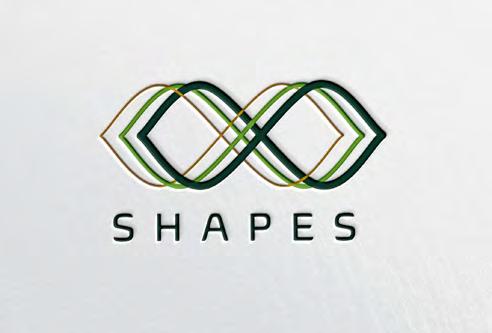
maJor research hIghlIghts 2018/19
The SHAPES consortium bid to Horizon 2020 was one of 36 bids for research funding in 2018
The Department of Psychology has enjoyed considerable success in attracting significant amounts of external research funding. As of September 2019 there was live research funding of €10.9 million active in the Department of Psychology. In 2018, the Department of Psychology led 36 bids for research funding seeking in excess of €11.5 million, including the SHAPES consortium project bid to Horizon 2020 led by Professor Mac MacLachlan and Dr Michael Cooke. Further to this (and not included in the headline figure), Dr Desmond was the lead Maynooth University applicant, and co-principal investigator, of the ADVANCE Centre for Research Training successful bid to Science Foundation Ireland, an initiative with a total budget in excess of €13 million that will train 120 PhD scholars over the coming years. The amount of new funding achieved by the Department of Psychology in 2018/19 was €6.7 million. In the period of 1st January 2016 to 31st December 2018, the average research funding of a member of academic staff of the Department of Psychology was €587,000; this figure is 4 times greater than the University average funding per academic staff member FTE.
The Department has a strong commitment to the supervision and mentoring of doctoral research students and post-doctoral researchers. In the 2018/19 academic year, there were 33 registered research students in the Department of Psychology. This equates to a rate of supervision of 2.1 research students per academic staff member. The department also hosted 12 research associates and fellows in 2018/19.
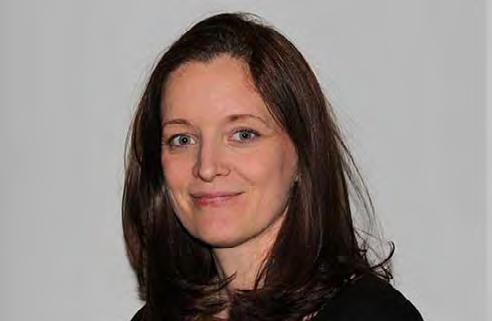
Research by members of the Department of Psychology received significant national and international press coverage in 2018/19. Dr Brenda O’Connell co-presented with Professor Niall Moylan on RTÉ’s Growing Up Live on how we develop in our 20’s, focusing on what science tells us about happiness during this life stage. Dr Michael Daly’s work on self-regulation and health and well-being featured in the Irish Times. Dr Bryan Roche’s work on intelligence featured in the Irish Times. Professor Sinéad McGilloway’s work on the PRIMERA project on family interventions where a parent has mental health difficulties, received significant coverage across national media. Professor Andrew Coogan’s work on sleep and type 2 diabetes received world-wide coverage via Reuters, and his expert opinion on the debate on daylight savings time was covered in a number of media outlets.
Dr Deirdre Desmond
Dr Deirdre Desmond led the Maynooth University component, and is co-principal investigator, of the successful bid to Science Foundation Ireland for the Centre for Research Training in Advanced Networks for Sustainable Societies (ADVANCE), a doctoral training centre that currently has 14 research supervisors. Its supervisors are drawn from STEM and Social Sciences disciplines, including Psychology, Electronic Engineering, the Hamilton Institute, Law, Mathematics and Statistics, and Sociology. This major initiative is aimed at addressing the challenges of advances in technological capabilities continuing to outpace our understanding of the personal and social significance of such developments and the ethical, legal and policy frameworks to govern their deployment. The vision of the centre is to train the next generation of researchers seeking solutions to the technical and societal challenges of connectivity between large numbers of people and things.
The key findings of the ENRICH programme, led by Professor Sinéad McGilloway and the Centre for Mental Health and Community Research, were launched in September 2019. The ENRICH programme involved a five-year research investigation of a new service called the Upto2/Parent and Baby Programme which combines many different health and education-related parenting supports which was delivered to almost 400 parents and their 0-2
year old children in West Dublin and Louth. The research, funded by the Health Research Board, found that the parents who received the programme became more confident and more satisfied in their role and adopted more sensitive and proactive styles and skills when managing their young infants. These benefits were also sustained after two years. Parent satisfaction with the programme was very high. This research highlights the case for more State support for parenting interventions in the earliest years; indeed, the National Economic and Social Forum stated a return on investment in this regard, of €4-€7 for every €1 invested. This research also provides an example of how university researchers can work successfully with multiple community partners who, in this case, included Archways, the Deansrath Family Resource Centre, the Clondalkin Community Healthy Living Initiative, the Connect Family Resource Centre and the Genesis programme.
Professor Mac MacLachlan and Dr Michael Cooke of the Department of Psychology and ALL Institute led the successful funding application for a major consortium to the EU Horizon 2020. The project, called Smart and Healthy Ageing through People Engaging in Supportive Systems (SHAPES), will be spread across four years and aims to find ways of helping Europe’s ageing population live actively and independently at home in their communities with the support of assisted living technology. In Europe and elsewhere, better access to healthcare is leading to an increase in the average age of populations. This results in a population at greater risk of cognitive impairment, frailty and multiple chronic health conditions. These can have considerable negative consequences for independence and quality of life of older people, and for the sustainability of health and care systems. SHAPES aim is to achieve large-scale deployment of integrated technology to achieve independence and a quality of life for older people. This is a €21m European research project consisting of 36 partners across 14 countries and is the largest ever grant for healthcare research led by an Irish institution. The Maynooth University component of the project is funded to €2.8 million. This is the first EU framework consortium grant coordinated by Maynooth University.
A number of members of the Department and the ALL Institute made major contributions to the World Health Organisation GReAT Consultation 2019 held in Geneva, an event which brought academics, practitioners, policy makers, and assistive technology users together to guide the content development of the Global Report on Effective access to Assistive Technology.
The Department of Psychology proudly hosted The Psychology, Health and Medicine Conference, chaired by Dr Laura Coffey. This annual celebration of health psychology on the island of Ireland is now in its sixteenth year, and represents a highly successful ongoing collaboration of the Divisions of Health Psychology in the Psychological Society of Ireland and the British Psychological Society Northern Ireland Branch. Over 120 delegates from Ireland and further afield attended the conference, with representation from a broad range of third level institutions, healthcare organisations and service providers. The conference had a packed schedule, including 30 oral presentations and 54 poster presentations showcasing a diverse range of high-quality innovative research at the interface of psychology, health and medicine, and featuring three internationally renowned keynote speakers – Ms. Marie Ennis-O’Connor, patient advocate and expert in healthcare social media; Professor Claire Foster, Professor of Psychosocial Oncology and Director of the Macmillan Survivorship Research Group at the University of Southampton; and Professor Carsten Wrosch, Research Chair in Ageing and Health and Professor of Psychology at Concordia University, Montreal, Canada.
As well as some of the research highlights described earlier which have strong engaged-components, other examples of engaged research undertaken by members of the department in 2018/19 are:
Professor Andrew Coogan continued his ongoing collaboration with the Diabetes Centre at Blanchardstown Hospital, examining the significance of sleep for the management of type 2 diabetes. Further, he delivered a report to the Garda Representative Association on experience of, and attitudes to, duty rosters in An Garda Síochána. This work involved a survey of nearly 5,000 rankand-file Gardaí in order to help inform future work-practice reforms in An Garda Síochána.
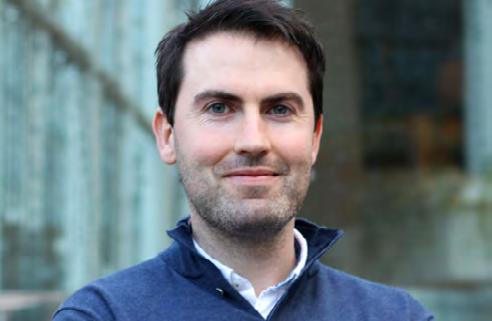
Dr Philip Hyland
Dr Philip Hyland was appointed by the Global Collaboration on Traumatic Stress to lead a project called ‘G‑Stress’ to determine global prevalence rates of disorders specifically associated with stress (www.global‑psychotrauma.net/). Dr Hyland was also an invited speaker at a conference in the UK for the British Psychological Society’s Crisis, Disaster and Trauma Psychology Section on Complex PTSD. Dr Hyland also established a formal research collaboration with the HSE’s Keltoi centre for drug rehabilitation, Merchants Quay Ireland, CBM Ireland, Uppsala
Hospital, and the City of Vienna’s Women’s Department for a programme of engaged research.
Dr Rebecca Maguire engaged with the European Multiple Sclerosis Platform (EMSP) on a project designed to meet the needs of paediatric MS caregivers. Dr Maguire was also awarded a place on IPPOSI (The Irish Platform for Patient Organisations, Science and Industry) patient education programme which ran through 2019. This has led to a greater awareness of considerations and importance of engaging patients and public in research (PPI) and this knowledge is being used to actively contribute to the recently formed Maynooth University Public Patient Involvement working group.
Professor Sinéad McGilloway supervises the Irish Research Council funded “More than a Selfie” project, an employmentbased piece of research in collaboration with Bodywhys (www. bodywhys.ie). This project investigates the impact of social media on body image and self-esteem in secondary school children, and the team are developing and evaluating an intervention aimed at addressing issues related to social media in young people. Professor McGilloway’s PRIMERA team also hosted a ‘Family Talk Rally’ and ‘Family Talk Masterclass’ in 2018 and 2019, two engagement and training events attended by well over 100 AMHS and CAMHS clinicians across the country, and including service user involvement.
Dr Unai Diaz-Orueta leads the Maynooth University component of the CAPTAIN consortium. CAPTAIN (Coach Assistant via Projected and Tangible Interface) is an EU H2020 funded project that uses innovative ‘transparent’ technology designed to turn the home of the older adult into a ubiquitous personalised‘coachingassistant’specificallydesignedtocompensate forphysicalandcognitive impairments encountered during everyday living. This project combines the use of projected augmented realit y,3Dsensingtechnologies,speechanalysis,non-invasivephysiologica landemotionaldata analysis (e.g. facial micro-expressions and body pose) to provide contextualised (e.g. directly projected onto the real world) and personalised coaching to older adults living at home. The consortium is made up of a multi-disciplinary team which feature technological, scientific, business, clinical, economic and policy-level competence across a number of public bodies and enterprises.
Dr Richard Roche led the Recall Initiative, a two-year IRC New Horizons project (initially called the SEAN-Key project) which investigated the beneficial effects of a six-week programme of semi-structured, group-based guided reminiscence (known as Reminiscence Therapy) on cognitive and psychological measures. The programme was run with groups of community-dwelling older adults across four locations (Maynooth, Tallaght, Swords, city centre), and with a group of people with a diagnosis of dementia in Peamount Hospital. Audio recordings of the content of weekly sessions were uploaded to a designated section of the Digital Repository of Ireland where participants and researchers can search and study the qualitative contents. The Reminiscence intervention showed some signs of benefits to the dementia group, which small improvements on aspects of autobiographical memory, which similar benefits were evident for a participant with Transient Episodic Amnesia. The initiative relied heavily on engagement from the local community and amenities (e.g. the local public libraries), and involved a strong Public Patient Involvement component. Content from the recordings will form the basis for an Illuminations Exhibition in early 2020.
dePartment of theoretIcal PhysIcs
The Department of Theoretical Physics hosts 6 academic staff who published 12 articles in peer reviewed journals and 3 peer reviewed conference proceedings in 2018. The department was very successful in the 18/19 round of competitive Government of Ireland postgraduate scholarship programme from the Irish Research Council wining 2 PhD scholarships both under the supervision of Dr Masud Haque. The students’ research programmes will encompass research on quantum matter approaching chaos and quantum dynamics of bosonic many-body systems. In addition 2 PhD students graduated in 18/19.
cosmology and astroPhysIcs
Professor Peter Coles’s main work is on statistical cosmology, with a particular emphasis on the large-scale structure of the Universe and the cosmic microwave background. In the period covered by this report his work has largely focused on developing and testing methods for the analysis of relevant data sets (either alone or in combination).
A particular focus of this work is preparation for the European Space Agency's Euclid mission, which is due for launch around 2020 and which will be used to probe the nature of dark matter, dark energy and the geometry of the expanding Universe.Professor Coles is a full member of the Euclid Consortium and is in the Galaxy Clustering Working Group currently preparing analysis methods for the exploitation of the resulting survey data. The involvement of Maynooth in the scientific exploitation of the Euclid mission gives the Department a unique opportunity, both for research and for its enormous potential for outreach and science communication.
The early part of May 2019 saw a number of major outreach events based on the centenary of the 1919 Eclipse Expeditions that measured the gravitational deflection of light by the Sun and thus tested Einstein’s general theory of relativity. These included several public talks by Professor Coles in Ireland and in the UK, an interview with Pat Kenny on Newstalk Radio, and a piece for RTÉ Brainstorm.
The Open Journal of Astrophysics, an online Open Access journal published by Maynooth Academic Publishing, was launched
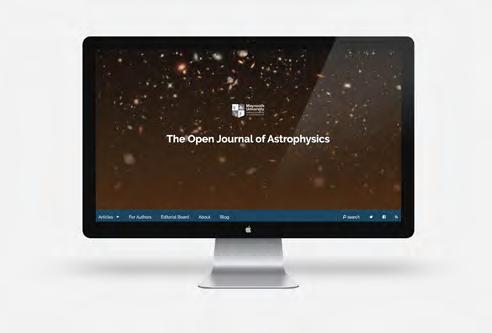
In addition, Professor Coles is responsible for a major new scientific publishing initiative at Maynooth University with the launch of The Open Journal of Astrophysics, an online Open Access journal published by Maynooth Academic Publishing, which has already attracted a number of high-profile and highly cited scientific papers.
general relatIVIty and fIeld theory
Over the period covered by this report, Professor Brian Dolan has continued to work on:
> Thermodynamics of Black Holes in semi-classical General
Relativity.
> Relativistic quantum field theory in particle physics models.
> Non-commutative geometry in field theory.
> Quantum field theory in condensed matter systems, in particular in the context of infra-red emergent symmetries in the quantum
Hall effect.
Professor Dolan’s work on thermodynamics of black holes has received especially significant amount of attention from the international community, especially the suggestion that the cosmological constant in the equation of state for a black holes in an asymptotically anti-de Sitter or de Sitter space-time plays the role of a thermodynamic pressure whose conjugate thermodynamic variable gives an invariant meaning to the volume of the black hole. One of the papers on this topic already has over 120 citations (google scholar).
far‑from‑eQuIlIbrIum Quantum dynamIcs
Dr Haque’s recent work in this area has covered:
> Propagation and scattering phenomena in quantum lattices.
> Thermalisation and relaxation dynamics. > The role of integrability in dynamical phenomena.
In addition to a strong profile in quantum non-equilibrium physics, Dr Haque has also contributed significantly to the theory of many-particle physics in laser-cooled trapped atomic gases and the application of quantum information concepts (entanglement measures) to condensed matter phenomena, such as topological ordering.
non‑PerturbatIVe Quantum fIeld theory
Dr Jonivar Skullerud’s research in these areas has covered:
> Non-perturbative quantum field theory, in particular lattice gauge theory.
> Quantum chromodynamics (QCD) at high temperature and density, and phenomenology of heavy-ion collisions.
> The problem of colour confinement; quark and gluon correlation functions.
> Bayesian inference and methods for solving inverse problems.
Dr Skullerud is a leading member of the FASTSUM collaboration, comprising researchers from Florence, Sejong (Korea), Swansea and Trinity College Dublin as well as Maynooth.The focus of the collaboration is on the study of the quark-gluon plasma using anisotropic lattice QCD.A highlight in the period of the review was the first calculation of the electrical conductivity in QCD above and below the de-confinement crossover; the two publications arising from this have received over 200 citations to date.
toPologIcal Phenomena In condensed matter PhysIcs and theIr aPPlIcatIon to toPologIcal Quantum comPutatIon
Dr Joost Slingerland’s research in these areas has focused on:
> Topological Field Theory.
> Lattice models which realize topological orders with local
Hamiltonians.
> Fractional quantum Hall systems and related strongly correlated systems with nontrivial topological order.
> Dynamics of systems with topologically stored quantum information, particularly quantum wires with topological edge modes.
Over the period covered by this report, Dr Slingerland’s group developed a number of methods for the study of trial wave functions in quantum Hall systems and their entanglement properties. We also introduced new trial wave functions which may describe certain Hall systems on lattices. We were among the first to consider quantum
quenches in topologically ordered systems.Recently, we have focused on dynamical and spectral properties of quantum wires, which are relevant to fault-tolerant quantum information processing.
toPologIcal Quantum fIeld theorIes
Dr Vala’s work in this area has covered such topics as:
> Topological phases in lattice models and condensed matter systems.
> Topological and conventional quantum computation.
> Quantum control and algorithms.
> Theory of open quantum systems and quantum error correction.
Dr Vala’s group has investigated the realization of topological quantum field theories in two-dimensional quantum lattice models with applications of these systems in topological quantum information processing. Specifically, a solution of the Kitaev honeycomb model has been developed on manifolds with dislocation defects based on Jordan-Wigner fermionisation. We believe that these systems constitute a realization of extended topological quantum field theories.The group has also generalized its previous solution of the Kitaev model on a torus to manifolds of higher genus. While we have confirmed the topological properties the ground state of these higher genus systems, as expected from their effective theories, we now also have full access to their fermionic band structure.In addition, the group has proposed a realization of topological lattice models using nanowire networks.
The group’s work on conventional quantum computation involved development of quantum algorithms and quantum control techniques for optimal generation of quantum computing operations. Special attention was given to operations, which are able to create maximally entangled states out of some product states, known as perfect entanglers. The group designed a control functional for optimal quantum control to generate two-qubit perfect entanglers and showed their superior convergence properties. They also studied metric properties of two-qubit operations and calculated analytically that two-qubit perfect entanglers form 84% of all two-qubit operations. In December 2019 Dr Vala was a member of a research consortium that was awarded €7.3 million under the Government’s Disruptive Technologies Innovative Fund. The project Quantum Computing in Ireland: A Software Platform for Multiple Qubit Technologies, will explores their potential to address challenging problems arising in areas such as financial services, logistics or drug discovery.
The consortium comprises IBM Ireland Ltd, MasterCard Ireland, Rockley Photonics and Equal 1 Laboratories, Maynooth University, the Tyndall National Institute (Cork) and University College Dublin. The budget allocation to Maynooth University is €600,000. The project is to start in 2020 and is for the duration of three years.










